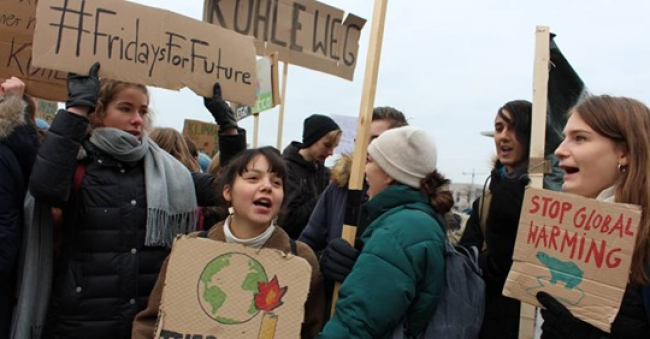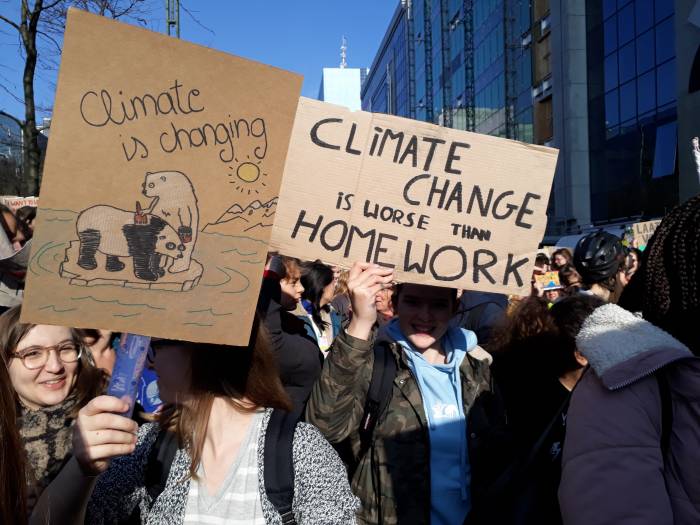Articles Menu

With classrooms unusually quiet but the streets of towns noisy and alive with young people marching and chanting, you can’t have missed the growing #FridaysforFuture movement. This Friday 24 May will be even noisier than usual with nearly 4000 school strikes in 150 countries planned around the world!
What first started as a one-person strike by a Swedish teenager Greta Thunberg, has now gathered momentum and spread all across the world into the largest climate mobilisation ever. Kids are striking for climate, and for the future. The students are sending world leaders a powerful message: we want bold action on climate change, NOW.
If you’re a grown-up, parent, grandparent, a teacher, or simply an ally, and the striking kids have inspired you too, but you’re not sure how you can take action, read on.
Here’s 5 meaningful ways you can support the climate strikes:
It’s as simple as it sounds. Tell the people you know – young or grown-up – about the climate strike, share with them why it’s important. Tell them about Greta’s message of climate emergency, and show them one of her powerful speeches. Share with them this map of all 24 May strikes and invite them to join, or support, any follow-up strikes or climate actions in your area.
If you’re a parent or guardian, make it explicit that you allow your kids to go on strike, if they want to. Share it with your friends, colleagues, and family members. Lead others by example. Don’t underestimate the power you have to inspire your friends if you’re passionate about a cause.
But remember – your role is to listen and amplify, not step in and take over. Make sure you hear the concerns, hopes and beliefs of young people around you. Take them seriously. Be their ally in conversations you have with other adults: be explicit about your support, help bring the message of the striking students into spaces where they can’t be present.
Share this video on Facebook and Twitter to let your friends and family know about the climate strike.
SHARE ON FACEBOOK SHARE ON TWITTER
Activate your own network (yes, you have one!) in support of the school strikes. Think of the organisations, clubs or faith groups you belong to. Maybe you’re in a parents group, or a bookclub? Talk about the school strikes at your next meeting; take to social media and share a public statement of support. Organise others for solidarity actions and events.
Take it even further: maybe you or your friends know a reporter at your local radio station or newspaper? Ask them to cover the school strikes. Maybe you’re on good footing with a local politician or someone from your municipality? Get in touch and ask them to help amplify the climate strikes – or not to discourage the mobilisations or penalise striking students!
If you’re part of an existing climate campaigning group, think of how you can escalate your actions around the strikers next action to keep the momentum going. Link your action explicitly to the school strikes (“We’re doing this because we’re answering the call of the striking students, and taking action”).

Think long-term: talk with your kids or other grown-ups about what could be done to keep up the momentum after 24 May. What are the practical things that are needed? Start a WhatsApp group, plan an informal get-together or a film evening.
If you’re a teacher or youth worker, make it a point to talk about the school strikes in your class. Mobilise your colleagues in school to talk to their classes as well. Even better: invite student strikers to talk with young people in your class. Don’t underestimate how young people relate to their peers. Make your support clear. Answer questions about how one can stay safe in a big crowd. Together with colleagues, speak to the school administration and tell them about your support for the school protest.
For teachers
Are you a teacher in France or Germany? Sign and share one of the solidarity statements launched by teachers’ collectives.
>> I’m a teacher in France.
>> I’m a teacher in Germany.
>> I’m a teacher in another European country.
In short: help make it possible, easy and safe for kids to attend the strikes, if they choose to.
Hands-on logistical support is often needed just as much as moral support. Buy your kids or grandkids a public transport ticket to get to the closest school strike. Prepare them a lunch bag or snacks to share with their fellow students.
Often it’s adults who need to register demonstrations, so you can really help the young people with any administrative issues they might face. Volunteer to be a steward for upcoming school strikes, a legal guardian or supervisor for a group of students wanting to join a strike.
Offer kids in your life support with arranging of preparing materials for signs and banners to take to the demonstration. Look for old cardboard or arts supplies in your house which they can re-use, or take them to the city to buy paper, markers and other things they need. Let your child host a “Make your own banner” evening at your house and let them invite their friends.
Most calls for school strikes ask for solidarity from adults, and welcome everyone to join.
If you choose to, you can join the strikes on May 24, by attending a march, rally or other mobilisation being planned in your area. But be mindful about your role as an adult in the protest. Stay on the sidelines, cheer the strikers on, take photos or videos (ask for consent if you photograph individuals!) and share what’s happening on social media to inform and inspire people who can’t join. Remember to add the #climatestrike and #fridaysforfuture hashtags!
When sharing content, make sure you let the protesters speak in their own words. You can do this for example by asking young people for a short statement on why they’re striking. Try to amplify voices of young people that you feel like are underrepresented in media. Describe the atmosphere, photograph the funniest banners, film the best songs and have fun!
Don’t let the young people do all the work! The climate crisis needs every single one of us to take action and fight for a fossil free future. The most meaningful way to support the school strikes is to listen, and respond, to their urgent call to action on climate change.
Check out this map of 350 and Fossil Free local groups and find the one closest to you. Sign up, write a message, go to the next meeting and get involved. Carry the energy of the youth climate movement into your own actions and organising. If you can’t find an existing group but feel motivated, sign up for an organiser’s starter pack, and we’ll help you set up your first local group or campaign!